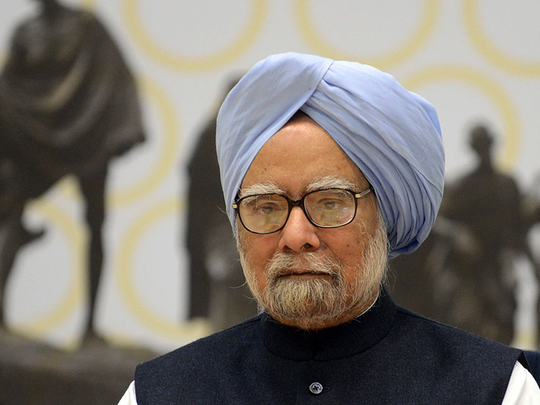
Dubai: In the summer of 2004, when a strident Bharatiya Janata Party (BJP) campaign put paid to Congress president Sonia Gandhi’s prime ministerial hopes — her Italian origin being the bone of contention — it was an Oxford-Cambridge educated academic who had come to the rescue of India’s Grand Old Party.
Sonia’s decision to anoint Manmohan Singh as the prime minister was a masterstroke that not only helped take the wind out of the BJP’s sail, but also kept the door open for son Rahul to step into the august office at an opportune moment.
While Sonia earned plaudits for her astute political calculations, the question that was doing its rounds in political circles of New Delhi and beyond was that what did an accomplished economist like Manmohan Singh stand to gain from an arrangement that offered him little in terms of political or intellectual capital.
And for the next 10 years, particularly during the later half of the second United Progressive Alliance (UPA) government at the Centre, as the image of the Congress party and the Union government was sullied by one major scam after another, Manmohan’s credentials as an honest public servant were needlessly put to a stress test.
And nothing was perhaps as damaging as the scam over the allocation of coal blocks, which, according to a report by India’s Comptroller and Auditor General (CAG) had resulted in windfalls to the tune of $170 billion (Dh625.26 billion). What compounded the crisis for the former prime minister was the fact that these gross irregularities in the allocation of coal blocks had taken place while Manmohan was in charge of the coal portfolio.
That is the point over which the Central Bureau of Investigation (CBI) was rapped on the knuckles by the court as special judge Bharat Parashar refused to accept the federal agency’s closure report on the scam, saying that it would be “appropriate” that Manmohan, the then Union coal minister, should be “first examined” to clarify certain crucial details pertaining to the ministry’s conduct of the allocation of coal blocks.
A Delhi court’s summons to Manmohan yesterday to appear before the court as an accused in the coal block allocation scam will certainly rank as the lowest point in the former prime minister’s illustrious career.
Apart from being the prime minister, Manmohan also held the portfolio of the Finance Ministry under former prime minister Narasimha Rao and it was in his capacity as the finance minister that Manmohan had presented the epoch-making Union Budget of 1996 that opened the doors of Indian economy under a game-changing push for liberalisation.
From being seen as a visionary who had changed the face of India’s economy to being served a court summons as an accused in a multibillion dollar scam, Manmohan’s career as a public figure seems to have made a full circle.
Right through his stint at 7, Race Course Road in New Delhi (the PM’s official residence) Manmohan had been seen as a “reluctant” prime minister, whose unquestioned allegiance to the party’s supreme leader (read Sonia) had often got the better of his scruples as a man of substance and commitment to his conscience. The obvious constraints of coalition politics made him silently suffer many a humiliation from coalition partners and Sonia’s presence as an extra-constitutional force within the government only made matters worse. He was never allowed a free hand at running the ship of which he was the commander.
But at the end of the day, it was a matter of choice and not of compulsion. He could have said “no” when it was needed, but he didn’t and probably a court summons as an accused is the price he pays for a ready compliance.












